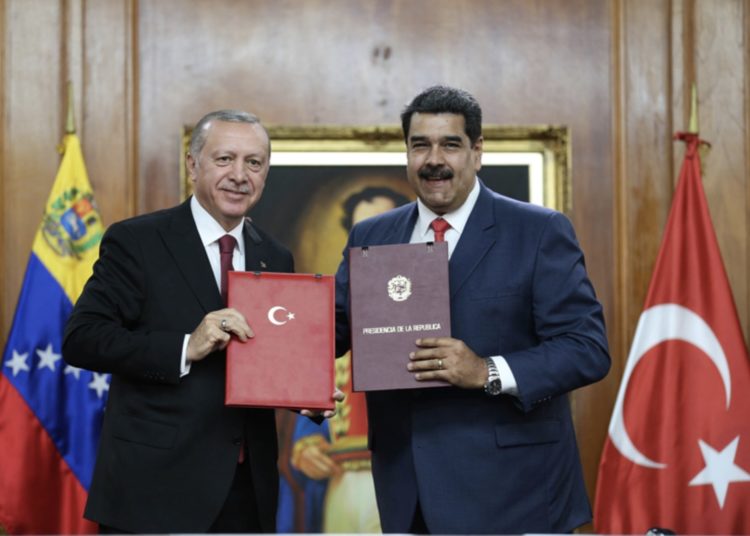Abdullah Bozkurt
Turkey and Venezuela have agreed to sweeping security cooperation ranging from sharing intelligence, operational information and weapons technology to joint police operations and the training of personnel in combatting terrorism and financial/economic crimes.
The text of the agreement, obtained by Nordic Monitor, shows that the two countries have not only implemented a number of security cooperation schemes but also agreed to insert undefined and vague terms in the agreement that give a broad mandate to the respective governments to expand security cooperation.
Section L of Article 3 states that as part of the agreement the two governments can “take any other action” in accordance with the purposes of the security deal, which gives a sweeping mandate to both parties to expand the deal as they see fit and take it beyond the standard security cooperation framework.
The deal provides cooperation in police training, joint operations, intelligence sharing and undercover operations. It bars the transfer of information and documents to third parties even after the expiration of the agreement.

The deal, officially titled “The Security Cooperation Agreement between the Government of the Republic of Turkey and the Government of the Bolivarian Republic of Venezuela,” was submitted for approval to the Turkish Parliament on May 3, 2019. It was originally signed on October 6, 2017 by Turkish Foreign Minister Mevlüt Cavusoglu and Venezuelan Foreign Minister Jorge Alberto Arreaza Montserrat.
The United States sanctioned Arreaza in April 2019 on the grounds that he was at the forefront of the Nicolás Maduro regime’s attempts within the international community to thwart the democratic aspirations of the Venezuelan people.
The 12-article agreement envisages a number of cooperation schemes in security matters and joint action in combatting crime such as human trafficking, money laundering, drug trafficking and terrorism.
According to the agreement, authorities in both Turkey and Venezuela will cooperate in intelligence, operational information and assessment sharing as well as techniques and methods used in combating terrorism. Given the notorious track record of how both the Turkish and Venezuelan governments have been branding legitimate opposition and critics as terrorists, the joint cooperation in terror-related matters gives rise to serious doubts as to how Maduro and Erdoğan might exploit the provisions of the agreement.
The parties also pledge to crack down on the activities of the visual and written media which they claim are linked to terrorist organizations and their front institutions operating in their territories against the other party. “The Parties consider them as illegal organizations and take appropriate measures in this regard according to their national legislations,” the agreement states. Turkey is the worst jailer of journalists in the world, with 188 journalists currently behind bars according to the most recently updated figures from the Stockholm Center for Freedom.

Both countries also committed to taking measures against persons and institutions providing financial or other support including sheltering, accommodation, training and treatment and logistical support to terrorist organizations in their respective territories.
According to Article 2 of the agreement, both Turkey and Venezuela will exchange information and experience regarding the weapons, equipment and technical installation used in combating terrorism and provide mutual training to the personnel of units working in counterterrorism. They will cooperate and exchange information by monitoring the movement of the technological equipment and all kinds of weapons and ammunition that can be used in the preparation and perpetration of terrorist acts.
The agreement allows Turkey and Venezuela to appoint liaison officers to increase the efficiency of interaction and coordination of joint actions within the framework of the agreement.
Section 5 of Article 2 gives a free hand to both governments to develop the agreement as they see fit on programs and projects for providing support in such areas as training, technical support and assistance and material donation and consultancy, with the aim of building the administrative and institutional capacities of the police, gendarmerie and coast guard.
As part of the deal, Turkey and Venezuela also agree to carry out joint police operations, exchange operational information and coordinate measures for the implementation of special investigative techniques and methods.
The agreement bars any party from transferring information, documents or technical equipment shared to third parties without the prior written consent of the authorities of the other party. “This principle shall be valid after the expiration of this agreement,” Article 5 states.
The Interior Ministry on the Turkish side and the People’s Power Ministry for Interior, Justice and Peace, the National Anti-Drug Office and the National Office to Counter Organized Crime and Financing of Terrorism on the Venezuelan side will administer the agreement.
The security agreement is valid for five years with automatic renewal unless prior notification for cancellation is made in writing six months before its expiry date.
The full text of the agreement is posted below:












